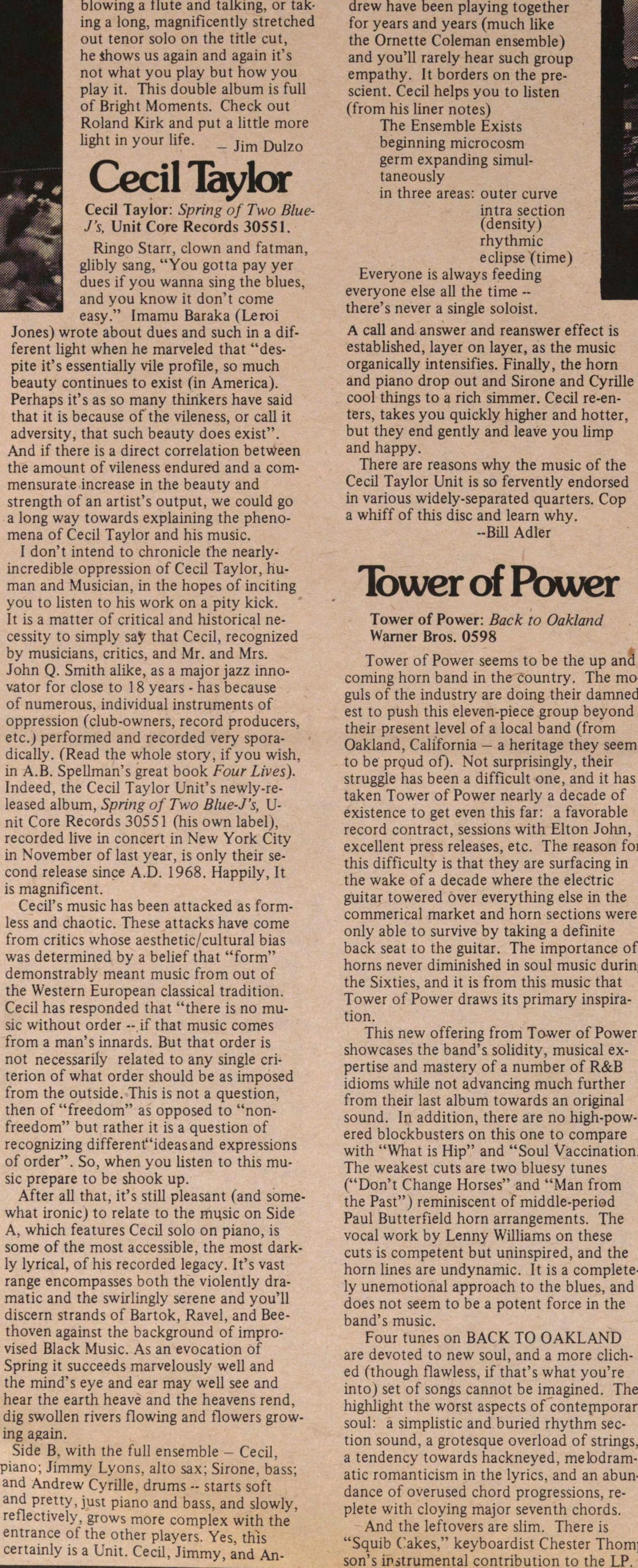Cecil Taylor

Cecil Taylor: Spring of Two Blue-J's, Unit Core Records 30551.
Ringo Starr, clown and fatman, glibly sang, "You gotta pay yer dues if you wanna sing the blues, and you know it don't come easy." Imamu Baraka (Leroi Jones) wrote about dues and such in a different light when he marveled that "despite it's essentially vile profile, so much beauty continues to exist (in America). Perhaps it's as so many thinkers have said that it is because of the vileness, or call it adversity, that such beauty does exist". And if there is a direct correlation between the amount of vileness endured and a commensurate increase in the beauty and strength of an artist's output, we could go a long way towards explaining the phenomena of Cecil Taylor and his music.
I don't intend to chronicle the nearly-incredible oppression of Cecil Taylor, human and Musician, in the hopes of inciting you to listen to his work on a pity kick. It is a matter of critical and historical necessity to simply say that Cecil, recognized by musicians, critics, and Mr. and Mrs. John Q. Smith alike, as a major jazz innovator for close to 18 years - has because of numerous, individual instruments of oppression (club-owners, record producers, etc.) performed and recorded very sporadically. (Read the whole story, if you wish, in A.B. Spellman's great book Four Lives). Indeed, the Cecil Taylor Unit's newly-released album, Spring of Two Blue-J's, Unit Core Records 30551 (his own label), recorded live in concert in New York City in November of last year, is only their second release since A.D. 1968. Happily, It is magnificent.
Cecil's music has been attacked as formless and chaotic. These attacks have come from critics whose aesthetic/cultural bias was determined by a belief that "form" demonstrably meant music from out of the Western European classical tradition. Cecil has responded that "there is no music without order - if that music comes from a man's innards. But that order is not necessarily related to any single criterion of what order should be as imposed from the outside. This is not a question, then of "freedom" as opposed to "non-freedom" but rather it is a question of recognizing different"ideas and expressions of order". So, when you listen to this music prepare to be shook up.
After all that, it's still pleasant (and somewhat ironic) to relate to the music on Side A, which features Cecil solo on piano, is some of the most accessible, the most darkly lyrical, of his recorded legacy. It's vast range encompasses both the violently dramatic and the swirlingly serene and you'll discern strands of Bartok, Ravel, and Beethoven against the background of improvised Black Music. As an evocation of Spring it succeeds marvelously well and the mind's eye and ear may well see and hear the earth heave and the heavens rend, dig swollen rivers flowing and flowers growing again.
Side B, with the full ensemble - Cecil, piano; Jimmy Lyons, alto sax; Sirone, bass; and Andrew Cyrille, drums -- starts soft and pretty, just piano and bass, and slowly, reflectively, grows more complex with the entrance of the other players. Yes this certainly is a Unit. Cecil, Jimmy, and Andrew have been playing together for years and years (much like the Ornette Coleman ensemble) and you'll rarely hear such group empathy. It borders on the prescient. Cecil helps you to listen (from his liner notes)
The Ensemble Exists beginning microcosm germ expanding simultaneously in three areas: outer curve intra section (density) rhythmic eclipse (time)
Everyone is always feeding everyone else all the time -- there's never a single soloist.
A call and answer and reanswer effect is established, layer on layer, as the music organically intensifies. Finally, the hom and piano drop out and Sirone and Cyrille cool things to a rich simmer. Cecil re-enters, takes you quickly higher and hotter, but they end gently and leave you limp and happy.
There are reasons why the music of the Cecil Taylor Unit is so fervently endorsed in various widely-separated quarters. Cop a whiff of this disc and learn why.
--Bill Adler
Article
Subjects
Freeing John Sinclair
Old News
Ann Arbor Sun